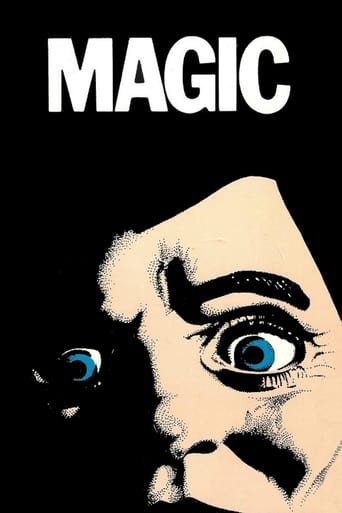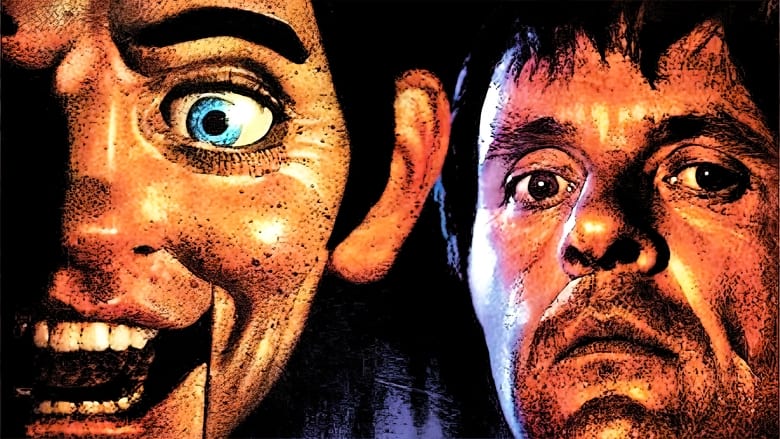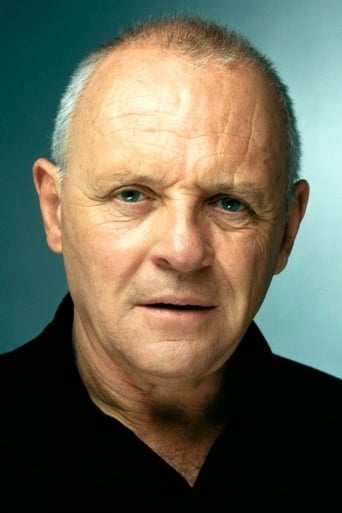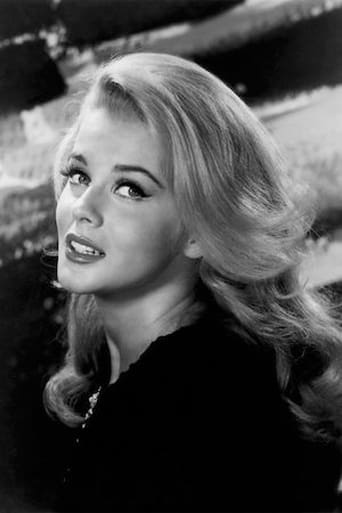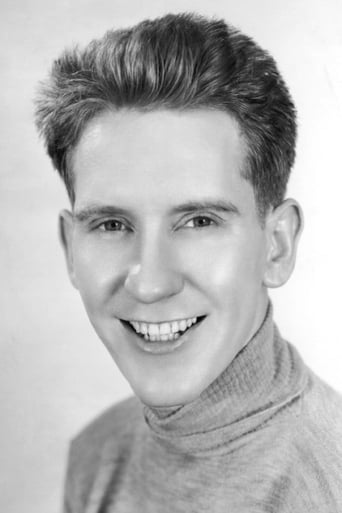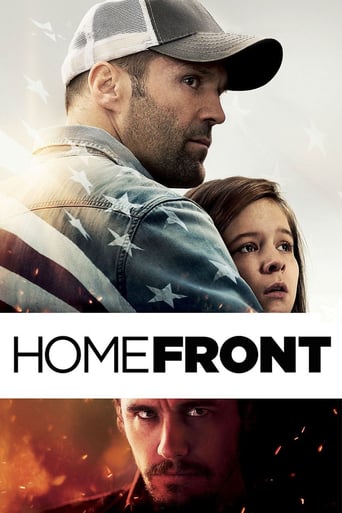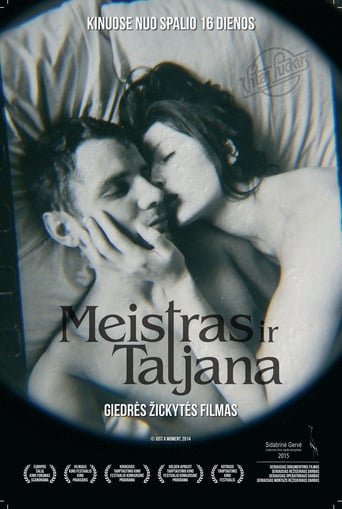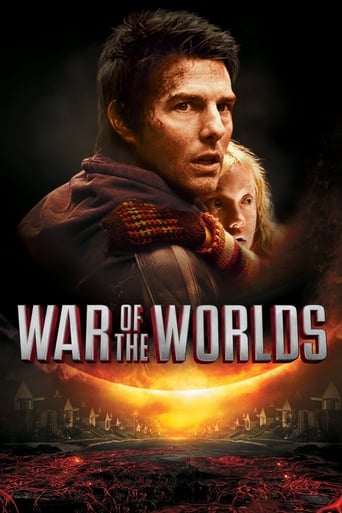Magic (1978)
A ventriloquist is at the mercy of his vicious dummy while he tries to renew a romance with his high school sweetheart.
Watch Trailer
Cast
Similar titles

Reviews
Must See Movie...
Fresh and Exciting
True to its essence, the characters remain on the same line and manage to entertain the viewer, each highlighting their own distinctive qualities or touches.
Actress is magnificent and exudes a hypnotic screen presence in this affecting drama.
Corky Withers is a struggling and not very successful stage magician until he comes up with the idea of combing magic with ventriloquism. He effectively forms a double act with his dummy, Fats, and the two prove a huge success. The gimmick behind the act is that Corky and Fats have completely different personalities. Corky on stage is a shy, diffident, self-deprecating young man. (Anthony Hopkins was forty at the time the film was made, but seems younger). Fats, by contrast, is a brash, cocky, wise-cracking loudmouth, ever ready to crack some bawdy joke, generally at Corky's expense. Corky is offered his own television show, but instead of signing runs off to the Catskill Mountains, where he grew up, and is reunited with his high-school sweetheart, Peggy Ann Snow, who is now unhappily married, and the two begin an affair. He is, however, unexpectedly joined in the Catskills by his agent Ben Greene, who is determined to find out the truth about Corky's sudden disappearance. And that truth is strange indeed. Corky is frightened that Fats has got out of control and has started to take over his life. By this I do not mean that the dummy is literally alive or that it has been taken over by an evil spirit like the doll in the "Child's Play" films. This may be a horror film, but it is a non-supernatural horror film in which everything that occurs has a rational explanation and which concentrates more upon psychology than upon gore. I do not even simply mean that Fats represents those aspects of Corky's personality which he has been trying to suppress. The truth is that Corky is mentally ill and suffering from schizophrenia. He uses Fats- with whom he holds conversations even off-stage- to express the other half of his split personality, and it is this, potentially violent, half which is getting stronger. When Greene discovers the truth and Peggy's husband starts to get jealous, Corky is tipped over the edge into violence. What surprises me about this film is how little-known it is, even though it was made by a well-respected director Richard Attenborough, and stars Hopkins, today widely regarded as one of the world's leading screen actors. Indeed, I had only vaguely heard of it until I caught it on television recently. Another thing that surprises me is that Hopkins was only the third choice for the role, although possibly in 1978 he was less well known than he is today, at least in America. The first choice, Jack Nicholson, turned it down. The second choice, Gene Wilder, had the support of both Attenborough and screenwriter William Goldman, but was vetoed by the producer who did not want an actor more associated with comic roles. We cannot, of course, know how the film might have turned out had either Nicholson or Wilder been cast, but I think that whoever was responsible for casting Hopkins made the right choice, because he is absolutely superb, as good as he was to be in better-known films such as "The Elephant Man", "Shadowlands" (also made with Attenborough), "Howard's End" and even "The Silence of the Lambs", for which he won an Oscar. Because of Corky's mental illness this is essentially a dual role as Hopkins has to convey quite different personalities, Corky's "normal" personality and the one he expresses though Fats, at the same time. He even has to use two different voices.( For all its vulgarity and the mayhem it leads to later, the "Fats" personality is initially an engaging one; it is clear why Corky's act was such a success). Hopkins receives good support from the lovely Ann-Margret as Peggy and Burgess Meredith as Greene.Attenborough's direction and Goldman's script are also first rate. The scenes set in the Catskills have a melancholy, autumnal quality which fits in well with the mood of the film. Without wanting to give away too much of the ending, I can say that in the final scene the talents of Hopkins, Attenborough and Goldman all combine to produce something genuinely moving. The term "neglected masterpiece" is perhaps over-used in the cinema, but in the case of "Magic" I can say that it is indeed appropriate. This is one film that really does deserve to be better known than it is at present. 9/10
Based on the 1976 novel of the same name by William Goldman who adapted it for the screen, this is an excellent, thought provoking and often very frightening psychological horror film. It is superbly directed by Richard Attenborough, my favourite director of all time. In several respects, however, it is a very atypical Attenborough film: it is a horror film (his only one), it is not based on real events (the first of only three) and it is not in any way an epic film. As a matter of fact, there are only four actors in the film after the first half an hour or so. Several actors given fairly prominent billing in the opening credits have five minutes screen time or less! I presume that Attenborough became interested in the novel during the making of his previous film "A Bridge Too Far", which was likewise written by Goldman. He clearly had little interest in the horror genre since he never revisited it, which is a shame as he is able to maintain a high level of tension for most of the film. I would have liked to seen more Attenborough helmed horror films. The score by Jerry Goldsmith is not up there with his absolute best but it's not far behind either.Anthony Hopkins gives wonderful performances as both the ventriloquist Corky Withers and his foul mouth, extremely creepy dummy Fats. From the first scene, Corky is shown to be an erratic person but, as the film progresses, it becomes increasingly clear that he is mentally unbalanced. The exact nature of his condition is never specifically stated but multiple personality disorder seems to be the most obvious conclusion. At one point, the dummy's eyes seem to move on their own, suggesting that, no pun intended, that there is more than meets the eye. However, in this instance, I prefer the psychological explanation as opposed to the dummy actually being alive. Fats represents the darker side of Corky's nature and he compels him to do things that I do not think that Corky would be capable of on his own. The voice that Hopkins uses for Fats is enough to send shivers down your spine when he tells Corky to kill. Hopkins learned ventriloquism for the film and became very skilled at it. Admittedly, you can see his lips move on occasion but that's true of some of professional ventriloquists that I have seen such as Edgar Bergen, whose daughter Candice appeared in Attenborough's next film "Gandhi" incidentally. I think that Hopkins deserved a Best Actor nomination for playing Corky and Fats. Appropriately, he received separate billing as both characters in the closing credits.The film has a small but very strong cast. Ann-Margret is excellent as Corky's high school crush Peggy Ann Snow, a kind, emotionally vulnerable woman who feels neglected by her often absent husband Duke and finds new love with the ventriloquist. She and Hopkins have great chemistry and their scenes together are always entirely believable, something which I feel is particularly important in a film like this. As Corky's cigar chomping agent Ben Greene, Burgess Meredith is not only perfectly cast but a delight. At first, Greene (nicknamed "Gangrene" by Fats) seems like the stereotypical ruthless Hollywood agent but he is genuinely concerned by Corky's mental instability when he learns that he cannot prevent Fats' personality from manifesting itself. The role of Greene was originally offered to Laurence Olivier but he was unavailable, perhaps because he was making "The Boys from Brazil" at around the same time. Olivier is one of my absolute favourite actors but I think that Meredith was better suited to the role. In any event, Olivier's health was quite precarious by then and there are a few scenes that I don't think that he would have been able to do physically.The only other major cast member is the great character actor Ed Lauter who plays Duke, who comes across as a good man in spite of the fact that he is not a particularly loving husband. He is depressed due to his perceived failure as a provider and fears that he will lose Peggy Ann as a result. Although he does not appear until after the hour mark, Lauter manages to invest his character with pathos and I really felt for him. Duke was more than the walking cliché that most husbands are in films dealing with essentially loveless marriages. E.J. André, David Ogden Stiers and Jerry Houser are great in the small roles of Corky's mentor Merlin, Todson and the taxi driver respectively. Like many directors, Attenborough employed a stock company of actors but Hopkins is the only one present on this occasion. Even his brother-in-law Gerald Sim doesn't get a look in for once! Overall, this is a classic and underrated example of both Attenborough's work as a director and the psychological horror genre. I think that part of the reason why I found the film so effective is that I always thought that ventriloquists' dummies were more than a little creepy. I am clearly not the only one as the premise of an evil dummy, either as a living being or as an additional personality of the ventriloquist, has been explored in several other works such as the earlier films "The Great Gabbo" and "Dead of Night", two separate episodes of "The Twilight Zone" (not ones featuring Meredith, unfortunately) and by DC Comics through the Batman villain Arnold Wesker / The Ventriloquist.
Magic is directed by Richard Attenborough, has a screenplay by William Goldman based on his novel and stars Anthony Hopkins, Burgess Meredith and Ann-Margaret.Anthony Hopkins gives one of the greatest performances of his career as the troubled ventriloquist who descends deeper and deeper into madness. Hopkins actually learnt ventriloquism for this role and is very good at it.Corky(Anthony Hopkins)is a struggling magician who hits the big time when he creates an act with a dummy called Fats. The act makes Corky a star but soon Fats is taking over Corky's life and he loses his grip on reality. It's a chilling film and that dummy sure is freaky.Burgess Meredith is superb as Corky's agent Ben Greene. Meredith is especially brilliant in a scene where he walks in on Corky having an argument with Fats as if he were real. He asks Corky to go five minutes without speaking as Fats, it's a tense and painful scene to watch. You can see how concerned Greene is for Corky's mental health and also how freaked out he is by the things Fats says. Hopkins excels in that scene as it becomes more and more obvious that he most likely will not be able to last the five minutes.Ann- Margaret is very good as Peggy the love of Corky's life. Fans of the TV series MASH will be delighted to see David Ogden Stiers appear as a man from a TV network who Greene asks to watch Corky's act.Magic is a great horror film from Richard Attenborough. Hopkins makes Corky a very pitiable character who becomes trapped in the nightmare that is his own mind.
Anthony Hopkins stars as a troubled and failed magician named Corky who hits upon the idea of using a dummy(named Fats) in his act, and becomes a big hit as a result. A veteran talent agent(played by Burgess Meredith) tries to push Corky to accept an offer of a network pilot special, but his insecurity resurfaces, and he flees to the rural Catskills and an old flame(played by Ann Margret) who little suspects just how unhinged(and murderous) Corky has become... Fine acting by Hopkins in a most credible portrayal of schizophrenic disorder, but film is surprisingly mundane and obvious. A classic episode of "The Twilight Zone" called 'The Dummy', with Cliff Robertson as a ventriloquist did a far better job of it in a precise 25 minutes, while this film rambles on for a further 80...
